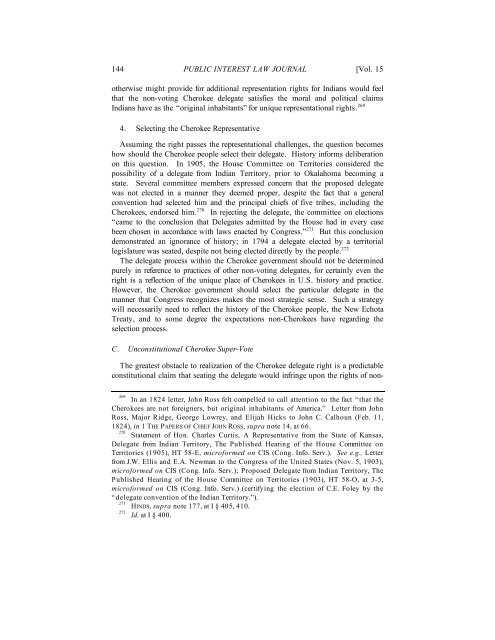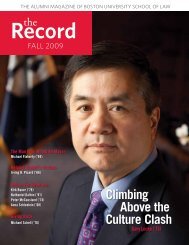the nature of representation: the cherokee right ... - Boston University
the nature of representation: the cherokee right ... - Boston University
the nature of representation: the cherokee right ... - Boston University
You also want an ePaper? Increase the reach of your titles
YUMPU automatically turns print PDFs into web optimized ePapers that Google loves.
144 PUBLIC INTEREST LAW JOURNAL [Vol. 15<br />
o<strong>the</strong>rwise might provide for additional <strong>representation</strong> <strong>right</strong>s for Indians would feel<br />
that <strong>the</strong> non-voting Cherokee delegate satisfies <strong>the</strong> moral and political claims<br />
Indians have as <strong>the</strong> “original inhabitants” for unique <strong>representation</strong>al <strong>right</strong>s. 269<br />
4. Selecting <strong>the</strong> Cherokee Representative<br />
Assuming <strong>the</strong> <strong>right</strong> passes <strong>the</strong> <strong>representation</strong>al challenges, <strong>the</strong> question becomes<br />
how should <strong>the</strong> Cherokee people select <strong>the</strong>ir delegate. History informs deliberation<br />
on this question. In 1905, <strong>the</strong> House Committee on Territories considered <strong>the</strong><br />
possibility <strong>of</strong> a delegate from Indian Territory, prior to Okalahoma becoming a<br />
state. Several committee members expressed concern that <strong>the</strong> proposed delegate<br />
was not elected in a manner <strong>the</strong>y deemed proper, despite <strong>the</strong> fact that a general<br />
convention had selected him and <strong>the</strong> principal chiefs <strong>of</strong> five tribes, including <strong>the</strong><br />
Cherokees, endorsed him. 270<br />
In rejecting <strong>the</strong> delegate, <strong>the</strong> committee on elections<br />
“came to <strong>the</strong> conclusion that Delegates admitted by <strong>the</strong> House had in every case<br />
been chosen in accordance with laws enacted by Congress.” 271 But this conclusion<br />
demonstrated an ignorance <strong>of</strong> history; in 1794 a delegate elected by a territorial<br />
legislature was seated, despite not being elected directly by <strong>the</strong> people. 272<br />
The delegate process within <strong>the</strong> Cherokee government should not be determined<br />
purely in reference to practices <strong>of</strong> o<strong>the</strong>r non-voting delegates, for certainly even <strong>the</strong><br />
<strong>right</strong> is a reflection <strong>of</strong> <strong>the</strong> unique place <strong>of</strong> Cherokees in U.S. history and practice.<br />
However, <strong>the</strong> Cherokee government should select <strong>the</strong> particular delegate in <strong>the</strong><br />
manner that Congress recognizes makes <strong>the</strong> most strategic sense. Such a strategy<br />
will necessarily need to reflect <strong>the</strong> history <strong>of</strong> <strong>the</strong> Cherokee people, <strong>the</strong> New Echota<br />
Treaty, and to some degree <strong>the</strong> expectations non-Cherokees have regarding <strong>the</strong><br />
selection process.<br />
C. Unconstitutional Cherokee Super-Vote<br />
The greatest obstacle to realization <strong>of</strong> <strong>the</strong> Cherokee delegate <strong>right</strong> is a predictable<br />
constitutional claim that seating <strong>the</strong> delegate would infringe upon <strong>the</strong> <strong>right</strong>s <strong>of</strong> non-<br />
269<br />
In an 1824 letter, John Ross felt compelled to call attention to <strong>the</strong> fact “that <strong>the</strong><br />
Cherokees are not foreigners, but original inhabitants <strong>of</strong> America.” Letter from John<br />
Ross, Major Ridge, George Lowrey, and Elijah Hicks to John C. Calhoun (Feb. 11,<br />
1824), in 1THE PAPERS OF CHIEF JOHN ROSS, supra note 14, at 66.<br />
270 Statement <strong>of</strong> Hon. Charles Curtis, A Representative from <strong>the</strong> State <strong>of</strong> Kansas,<br />
Delegate from Indian Territory, The Published Hearing <strong>of</strong> <strong>the</strong> House Committee on<br />
Territories (1905), HT 58-E, micr<strong>of</strong>ormed on CIS (Cong. Info. Serv.). See e.g., Letter<br />
from J.W. Ellis and E.A. Newman to <strong>the</strong> Congress <strong>of</strong> <strong>the</strong> United States (Nov. 5, 1903),<br />
micr<strong>of</strong>ormed on CIS (Cong. Info. Serv.); Proposed Delegate from Indian Territory, The<br />
Published Hearing <strong>of</strong> <strong>the</strong> House Committee on Territories (1903), HT 58-O, at 3-5,<br />
micr<strong>of</strong>ormed on CIS (Cong. Info. Serv.) (certifying <strong>the</strong> election <strong>of</strong> C.E. Foley by <strong>the</strong><br />
“delegate convention <strong>of</strong> <strong>the</strong> Indian Territory.”).<br />
271 HINDS, supra note 177, at I § 405, 410.<br />
272<br />
Id. at I § 400.









